Director John Carpenter is distinguished for classic genre-defining films such as The Thing and Halloween. It's little known that in 1976 Carpenter directed Assault on Precinct 13: this taut, fast-paced, thoroughly riveting low-budget action film. The aptitude of Carpenter's film is the way he cleverly takes inspiration from several westerns (most notably Rio Bravo) as well as the classic zombie horror film Night of the Living Dead. Carpenter's overhaul of these films is undeniably one of the greatest action/thriller productions from the past few decades, but unfortunately it's now relatively disregarded (especially with the remake released in 2005). Assault on Precinct 13 is a completely diverse take on the customary police thriller: from start to finish the film is exciting, exhilarating, shocking and fast-paced - yet was backed by a minuscule budget!
Film students should take note of the dexterity in the filmmaking. The film's budget constraints are never palpable due to the technical proficiency: competent editing, focused directing, impressive acting and exciting action. It doesn't take long before the action kicks in. Brief dialogue scenes to set up the plot precede a wholly intense string of action. You will be on the edge of your seat until Carpenter allows you an opportunity to breathe again. As soon as the opening fire-fight and bloodbath erupts, we are then shown the relentless murder of a young girl before moving onto a vigorous siege when the action never lets up.
The film is set in an unsavoury part of Los Angeles where a gang known as Street Thunder rules the streets. They have acquired a cache of automatic weapons which the police force are currently searching for. After several gang members are killed in a police shoot-out, the remaining cohorts swear revenge and begin roaming the streets. Meanwhile, a nearby police precinct is set to be relocated. A skeleton staff supervised by lieutenant Ethan Bishop (Stoker) is brought on board to "baby-sit" the establishment until the official closing in the morning. A distraught father witnesses the death of his daughter, and then shoots the leader of the gang before running to the nearby precinct (the same one, of course) for protection. The gang follow the father to the precinct and declare war on the people inside. Throughout the course of the night, a siege unfolds as people inside work to defend themselves from the never-ending hordes of gang members.
The plot is straightforward, simple and easy to comprehend. Film students should further take note of the way Carpenter treats the simplicity of the plot. Carpenter employs the simple premise for a tense, compactly composed succession of action sequences, emphasising discreet character development and escalating tension. The action is so shockingly memorable due to the violence levels and high body count - it's so skilfully choreographed it totally belies the limitations of the small sets and no-name actors. The lighting is used to best effect, with the streets shown as dark and gloomy. This makes the situation even more menacing because the enemies are hiding in the unknown. John Carpenter also created the remarkably memorable and haunting score. It's catchy, stylish and incredibly original. The main theme is as unforgettable as his Halloween music. Also thrown into the mix is a cast of unknowns. Even though the film industry hasn't seen much of them since this film's release, they all complete their jobs outstandingly! If you're working on a low-budget action picture, this is definitely a film to turn to for inspiration.
Overall, Assault on Precinct 13 is an excellent action film. No-one can congregate restricted claustrophobia like John Carpenter. The cast of relative unknowns do a terrific job, providing potentially two-dimensional characters with genuine depth. This provides the audience with something real to be concerned about, rather than an assemblage of people we feel indifferent towards. Assault in Precinct 13 is certainly not the best film Carpenter has made, but it is still an unbelievably sturdy primitive effort and was a good indication of the master Carpenter was destined to become. Remade in 2005.
8.84/10
Brilliant action thriller
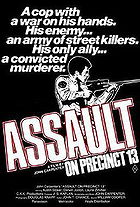 Posted : 16 years, 11 months ago on 5 July 2008 10:38
(A review of Assault on Precinct 13)
Posted : 16 years, 11 months ago on 5 July 2008 10:38
(A review of Assault on Precinct 13) 0 comments, Reply to this entry
0 comments, Reply to this entry
Overrated, but solid comedy/drama
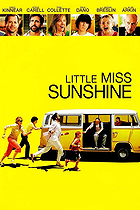 Posted : 16 years, 11 months ago on 5 July 2008 06:18
(A review of Little Miss Sunshine)
Posted : 16 years, 11 months ago on 5 July 2008 06:18
(A review of Little Miss Sunshine)
Little Miss Sunshine is ostensibly a road trip movie concerning the realisation that family is family. It's a wholly daunting task to reinvent the family road trip genre in this contemporary era of cinema, especially if the filmmakers are aiming for realistic as opposed to hyperbolic. Either the production is going to be entirely over-the-top akin to National Lampoon's Vacation, or the filmmakers strive to maintain a sense of reality: portraying the adventure to be tediously dull, reminiscent of an actual road trip. With Little Miss Sunshine, the action and comedy derive commonly from the people involved as opposed to a peculiar state of affairs the screenwriter desired to place them in. The film captures the dull nature of a road trip while also being highly entertaining. Problems are realistic, characters are poignantly pragmatic, atmosphere is enthrallingly convincing and locations are lifelike. This is an enormously unsullied and original idea: one of the most innovative pieces of American cinema for years. The film relies solely on a dexterous script that recognises the dissimilarities between generations in the same family. Each character is idiosyncratic and eccentric yet believable due to the amazing cast.
The film's title is derived from a beauty pageant in California. Young 7-year-old Olive Hoover (Breslin) has aspirations of winning said beauty pageant, and drags her dysfunctional family on a road trip bound for California. Olive's family consists of an interesting bunch of characters: chain-smoking mother Sheryl (Collette), bankrupt lecturer father Richard (Kinnear), suicidal Uncle Frank (Carell), mute-by-choice brother Dwayne (Dano), and quirky Grandpa Edwin (Arkin). To fulfil Olive's dreams, together the family hit the road in their VW bus, heading from Albuquerque to the pageant in Redondo Beach, California. During the trip the whole family are so burdened with their own quirks, neuroses, and problems that they can scarcely make it through a day without disasters befalling them.
One of the greatest facets of Little Miss Sunshine is that the majority of the film feels as though it could happen in the reality we all live in. The family home appears to represent the typical family home with no exaggerations or hyperboles present. Their reactions to the events that transpire continue to be as realistic as they can be even when the situation becomes increasingly cartoonish. However, the film's style is threatened in the last 30 minutes. When the VW bus drives all over the side-walks dodging pedestrians the humour had suddenly changed from subtle, clever black comedy to American slapstick. One of the most commendable things about the scripts is its tendency to avoid conventions and clichés. Even so, this praiseworthy predisposition simply becomes far too over-the-top with the events that occur during the film's final third. It would be an understatement to say that a better ending should have been concocted for Little Miss Sunshine. Its poignant messages about life ring true, that family should always stick together and that life is full of tragedies as opposed to miracles. But the message could have been delivered without being so depressing! What happens to the entire family towards the end is just ghastly. There's no reason for these happenings within the context of the story. There's no reason for it in the reality in which these characters subsist in. Most importantly, it doesn't ring true in any kind of veracity for the audience.
An aspect of the film I must mention is in relation to the beauty pageant. In a time succeeding Jon Benet Ramsey's death, it's sensitive territory to show little girls parading around like high class hookers with skimpy clothes. It feels wrong. Even though it's meant to be funny in its depiction of the extremes parents will force their children to endure, it's impossible to find any humour due to the scary thought that children have been murdered for doing this stuff. Of course, the film had to show some of the girls doing this to get the impression of the overwhelming competition Olive is up against, but perhaps there's just too much time dedicated to showing this. I felt uncomfortable watching this stuff for such a prolonged period of time.
The characters are perfectly executed by a perfect cast. These characters, the six we spend the entire film with, aren't the perfect, beautiful people commonly found in most "feel-good" American films. They have problems and imperfections, they are unhappy in life and, despite all that, try to do the best they can for as many people as possible. It is in the little moments where the most realistic moments come to life. Abigail Breslin cannot be faulted for her radiant performance. She's still extremely young, but has one heck of a career ahead of her. Greg Kinnear perfectly represents the typical father figure. Moments of poignancy also shine in Toni Collette's performance as the mother of the family. Both Kinnear and Collette feel true to life. Steve Carell is a real stand-out in the cast. Carell is also poignant as an uncle figure. Never is his concentration broken. This performance proves that Carell doesn't need to rely on overacting to be funny. This is one of his funniest performances just because of the subtle wit and dark humour. Alan Arkin is in a career best performance as the quirky grandpa. Paul Dano is also fantastic as Olive's brother. It's interesting to note that all characters experience a revelation (with the exception of Arkin's character). Most notable is Olive. Although the end of the film finds the world of everyone else completely crushed, Olive is just as happy to do what she's been doing, and she doesn't give a damn about what everyone else thinks.
Overall, Little Miss Sunshine is a good film...not a great film. The film is entertaining and I will watch it again for sure, but the hype was over-the-top and the Best Picture nomination wasn't deserved in lieu of the other great films released during 2006. There's an ideal cast, a terrifically suitable slate of music and an original reinvention of the family road trip genre; however the final 30 minutes are too depressing for the film's established context. It's a shame that another, dissimilar ending couldn't have been devised for Little Miss Sunshine. For the majority of the film, it is one of the best and most poignant films of all time. However, in the final 30 minutes the wheels completely fall off. So, does the ending destroy what has come before it? It'd be great to say no, but the fact of the matter is it leaves a bad taste in your mouth. All the fantastic performances we've witnessed on the screen and all the laughs we had at the expense of the characters are incapable to salvage a conclusion to which there is no acceptable explanation for.
7.9/10
 0 comments, Reply to this entry
0 comments, Reply to this entry
Like someone torturing you with a chainsaw...
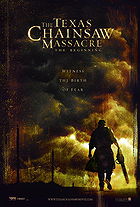 Posted : 16 years, 11 months ago on 4 July 2008 11:48
(A review of The Texas Chainsaw Massacre: The Beginning)
Posted : 16 years, 11 months ago on 4 July 2008 11:48
(A review of The Texas Chainsaw Massacre: The Beginning)
The Texas Chainsaw Massacre: The Beginning is an additional inept Hollywood gore fest that endeavours to misrepresent itself as a terrifying horror flick. After all ideas for sequels have come and gone, Hollywood studios then move onto the prequels. The philosophy behind this prequel was ostensibly to inform the audience of the back-story of "Leatherface" (Bryniarski) who is the central serial killer in the series. Clearly, the motivation was to reveal why the cannibalistic family become the way they end up...what pushed them over the line? First of all, I must rip into the concept. Tobe Hooper's 1974 original The Texas Chain Saw Massacre was absolutely petrifying because of the inability to understand the characters and their origins. Therefore with no palpable motivations, the characters are frightening. Thus revealing the genesis erases all mystery surrounding Leatherface and his family, and no longer do they possess a scary screen presence.
The second fatal flaw in the screenplay is not even fulfilling the concept! The first five minutes show Leatherface's birth, and then all of a sudden the central character is an adult chopping up meat just like he was in the predecessors. Cue the brainless, incompetently-minded characters travelling through Leatherface's region...prompt the rest of the sadistic family who are suddenly cannibals eating people, and the stage is set for a pointless rehash of the original films with a different slate of characters. This time, though, you can predict how it will end. We know the events that will unfold a few years later, thus these characters can't tell the tale to the authorities and uncover the mystery. Hence the villains won't get their comeuppance (there's no vengeance at all), and the audience are exposed to endless scenes of mindless torture.
I've basically described the film's plot, but I will elaborate further: Thomas Hewitt - a.k.a Leatherface - is born in a slaughterhouse in Texas and is abandoned in a dumpster. He is adopted into a family, and he grows up to become a worker at the same slaughterhouse. Then the slaughterhouse is closed down, with workers left unemployed. Many of the local inhabitants desert the area. The Hewitt family stays put, but are on the verge of starvation. Leatherface's deranged step-father executes the local sheriff, assumes his identity and begins running the town his cruel way. Two young couples then venture into the region and become hopelessly stranded. The Hewitt family wait...with an enormous assortment of torture tools on hand.
It's impossible to point out all the flaws evident in The Texas Chainsaw Massacre: The Beginning. The main flaw is its nature of nothing but a mindless gore fest. The film has no problem with moving from one unnerving torture scene to the next, with blood and guts spurting all over the place: showing more inventive methods to kill a human. I know, I know - I'm supposed to praise the low-budget affair for creating an authentic atmosphere with realistic gore, blah, blah, blah! The impressive gore effects aren't a redeeming feature. As a matter of fact, there are no redeeming features at all! With all the misogynistic scenes depicting horrible torture and rape of girls, I wanted to walk out of my viewing area and keep on walking.
Tobe Hooper's original film wasn't a gore fest. There was barely any gore at all! It was scary because of what you didn't see. Of course, modern movie-goers apparently search for endless amounts of blood and gore. If it's present in action movies I usually devour the violence as it's realistic and in an intriguing context. In the context of torture it's just stupid. The film is also plagued with stupid characters and villains that are stereotyped as having the superhuman ability to pop up anywhere at any time whenever things have potential to look up for the protagonists. The film has zero scares. Instead of suspense and terror, we have lots of blood flow with an equal amount of guts. Speaking in terms of successful relentless horror flicks, something like Wolf Creek does better. Even though that's largely a relentlessly gory affair it has more skill and class. This is crap! Stupid, pretentious, tasteless crap!
1.2/10
 0 comments, Reply to this entry
0 comments, Reply to this entry
Standard horror remake
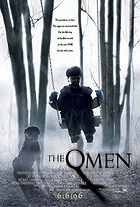 Posted : 16 years, 11 months ago on 4 July 2008 04:02
(A review of The Omen)
Posted : 16 years, 11 months ago on 4 July 2008 04:02
(A review of The Omen)
Considering the paranoid religious gibberish pertaining to the release of Richard Donner's 1976 horror flick The Omen, it's scarcely surprising that a remake was commissioned to tie in with the rare date of 6-6-06. In the current cinematic age, remakes of horror movies are a fickle beast endlessly being rolled out for money. Only rarely have I witnessed a horror remake that produced decent results (I have yet to see a brilliant remake) such as Zack Snyder's reinvention of Dawn of the Dead. Other remakes such as The Texas Chainsaw Massacre have become some of the worst segments of modern cinema. Put very simply, Hollywood has become too lazy to create original ideas, so they're recycling and reusing ideas for an easy profit. The creative team for The Omen were so lazy that the person who penned the screenplay for the original (David Seltzer) was hired to polish his own script for the remake.
This remake is absolutely futile. In essence, this remake adds nothing but occasionally impressive gory CGI effects, tasteless references to modern disasters (as a way of displaying the fulfilment of some religious mumbo jumbo that supposedly describes the signs of an impending Armageddon) and a more refined visual style. Aside from that it's essentially a word-for-word, almost shot-for-shot remake of Richard Donner's 1976 original with no additional scares. The filmmakers could have expanded the original film...they could have executed an entirely different treatment of the Book of Revelations...instead this is a purely futile duplicate of the original. Sure, some may think that if this is identical to the original than the scares must be the same...right? Wrong! The death scenes are more predictable, Marco Beltrami's score cannot set the creepy atmosphere of Jerry Goldsmith's music, and the cast are mainly woeful.
The plot is of course identical to that of Richard Donner's 1976 original, except the opening is a little different. The opening of this film depicts activity at the Vatican as the sighting of a comet confirms the world is on the eve of Armageddon. Cut to political figure Robert Thorn (Schreiber) who's racing to the hospital to be with his wife Katherine (Stiles) who has gone into labour. Complications during childbirth leave the child stillborn and Katherine unconscious with permanent damage to her womb resulting in an inability to bear another child. Father Spiletto (Radice), a priest working at the hospital, offers Robert a replacement for his loss: a young child born on the same night whose mother passed away during labour. Believing it is best for his wife's sake, Robert agrees to take the child; raising it as his own with Katherine's oblivious to the situation. Roughly 5 years later, young Damien (Davey-Fitzpatrick) is developing smoothly. But a series of peculiar deaths result in suspicions that the child is in fact the Antichrist - the son of the devil. Robert Thorn then works with photographer Keith Jennings (Thewlis) to discover more about the heritage of Damien.
The characters are portrayed poorly by a disappointing cast. Liev Schreiber cannot replace someone of Gregory Peck's stature. It's impossible to comprehend the praise that Schreiber received. He's a dreadful actor: emotionless expressions, monotone voice, no intensity in line deliveries. Julia Stiles should never have become an actress. Every time Stiles hauls her oversized cranium into shot, the movie grinds to a screeching halt as the theme of the film flips from proficient thriller to daytime soap-opera territory. Mia Farrow supplies the film with the only terrifying moments (a faint praise) as Damien's demonic nanny. Farrow flexed her only decent acting muscle in Roman Polanski's Rosemary's Baby...roughly 40 years ago! Her time arrived and passed long ago. Seamus Davey-Fitzpatrick is not sinister or frightening...he's an innocent little boy who cannot act! In the original, the young boy's facial expressions sent chills down your spine. Davey-Fitzpatrick sends tickles down your spine. David Thewlis was nominated for a Razzie award for 'Worst Actor'. I'm shocked at this because Thewlis is one of the only good actors in an otherwise dreadful cast. Julia Stiles and Liev Schreiber should have received the nominations! Pete Postlethwaite is frequently sincere in the role as a priest trying to warn Schreiber's Robert Thorn of the danger. Unfortunately, even he cannot cover up the flaws in the rest of the cast.
Overall, The Omen is yet another addition to the disparagingly extensive list of horror remakes that should never have been authorised. Perhaps as a standalone film it'd be a decent horror outing for the genre buffs. For those who've never seen Richard Donner's 1976 original, maybe some satisfaction will be uncovered. John Moore is a competent director who brings an intriguing visual style to the production; however this remake is pointless and there was never an apposite warrant for a remake (apart from the obvious marketing purposes). At the end of the day you end up wondering what the point was. Cinematic déjà vu is the most probable reaction.
4.2/10
 0 comments, Reply to this entry
0 comments, Reply to this entry
Old formula, clever comedy
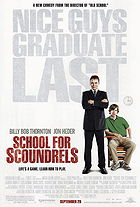 Posted : 16 years, 11 months ago on 3 July 2008 09:42
(A review of School for Scoundrels)
Posted : 16 years, 11 months ago on 3 July 2008 09:42
(A review of School for Scoundrels)
School for Scoundrels is a straightforward contemporary comedy: dexterous characters, genuinely hilarious moments and a few fascinating plot twists. It's the furthermost thing from an evocative, profoundly thought-provoking experience; however if you enjoy quality comedy with a number of pleasant laughs then this is undeniably a film to rent. I had elevated expectations for this film, particularly due to the cast. Jon Heder from Napoleon Dynamite, Billy Bob Thornton from Bad Santa, as well as a minor role portrayed by Ben Stiller. The plot also operates on an appealing premise of a battle of wits concerning two characters. Don't anticipate some form of masterpiece. Instead, settle down to watch School for Scoundrels with refreshments; assuming an undemanding, light-hearted comedy flick encompassing masses of merriment.
School for Scoundrels is a remake of an old 1960s film of the same name. The plot suitably mirrors said original film, logically enough. Roger Wadell (Heder) is a beleaguered, underachieving New York City meter maid inundated with countless issues of trepidation and a shockingly depleted level of confidence. One of Roger's friends wishes to assist him in overcoming his feelings of meagreness, and encourages him to enrol in a highly confidential school conceived to help people build confidence. This school is run by the dastardly Dr. P (Thornton). He's aided by the intimidating Lesher (Duncan) as he unleashes his sometimes dangerous methods of developing confidence in his students. Dr. P's goal is to encourage his students to consider themselves as lions in an animal kingdom - and it's a battle to become the leader of the pack. Soon enough, Roger's level of confidence begins to elevate and he finally becomes assertive enough to get involved with long-time crush: his Australian neighbour Amanda (Barrett). Roger is the stand-out student in Dr. P's class, but this prompts Dr. P to employ a more unorthodox method of instilling additional confidence: destroying Roger's professional and personal life. Through the eyes of Dr. P nothing is too far. Alas, an elaborate battle of wits emerges between the two men.
School for Scoundrels may seem like your standard, average contemporary comedy made for a quick buck. However, this film isn't as terrible as one would be expecting. The major stand-out is the solid script held together by a stellar cast and an able director (Todd Phillips, who also helmed Starsky and Hutch). Like all modern comedies, the film is skilfully made and unproblematic to watch. The film lacks laughs in the first half, but then things start looking up into the second half. There are loads of hysterically funny moments to witness during the film's second half. These laughs are slow to get going...nevertheless the wait is definitely worth it. Prepare to be laughing uncontrollably. I will admit that the film is slightly formulaic and clichéd. Then again, the film isn't as clichéd as I was expecting. Surprisingly, the screenplay manages to avoid succumbing to some clichés and still contains a hint of unpredictability.
The characters seem to be nothing more than a bunch of worn stereotypes; however despite the shallow material the cast pull off their roles excellently. Billy Bob Thornton, as always, accomplishes his role with tremendous skill. He plays one heck of an arrogant bloke, though. He suits the role: charming but deceptive. Of course, Jon Heder is another great addition to the cast. Heder is certainly entertaining enough to cover up many shortcomings in the script. Ben Stiller has a small role, but he's extremely memorable. Just his facial expressions had me in stitches, let alone his hilarious voice. Jacinda Barrett and Michael Clarke Duncan are also very talented in their roles.
Overall, School for Scoundrels is a simple comedy that makes for highly enjoyable viewing. Sometimes it's extremely clichéd; however the film is bright enough to maintain your interest throughout the running time. Although critics generally panned the movie, I unquestionably recommend it for a pleasant night of satisfying laughs and interesting characters. Reasonably forgettable, but still a lot of fun.
6.9/10
 0 comments, Reply to this entry
0 comments, Reply to this entry
Nothing special
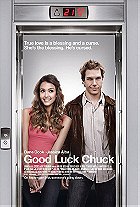 Posted : 16 years, 11 months ago on 3 July 2008 01:23
(A review of Good Luck Chuck)
Posted : 16 years, 11 months ago on 3 July 2008 01:23
(A review of Good Luck Chuck)
Good Luck Chuck is another addition to Hollywood's audaciously extensive list of raunchy romantic comedies made for an instant box office success. However this is an instance of a recent comedy that infused an impression of tremendous promise. First of all, this film encompasses an interesting premise. This premise is based on a true story of a man named Steve Glenn. Steve had seven relationships go south, and within a few months of breaking up, five of them had gotten married to the guy of their dreams. Good Luck Chuck exercises this story as a foundation to generate the plot. What would you do if you were cursed never to be in a permanent relationship? What if you slept with a girl, and then the girl married the next guy they dated? An additional contributing aspect to the film's potential is the cast. Two words: Jessica Alba. Are you still not convinced? Put quite simply, this is a comedy flick to view if you're bored and in the mood for some raunchy sex scenes.
The story of Steve Glenn is used for the film's protagonist: a dentist named Charlie Logan (Cook), known as Chuck among his friends. As a young child he rejects Gothic girl (Pieterse) that he wins during a game of spin the bottle. Said girl places a hex on Chuck: that he will never have an everlasting relationship and if he sleeps with a girl then they will find true love in the next guy they date. Chuck soon realises that this "good luck charm" (as it is now known on the internet) is rapidly becoming trendy among women who begin flocking to him and lining up for a quickie. Chuck's friend Stu (Fogler) is another of those fat-and-horny characters who will do anything for a lay! Chuck enjoys his impeccable reputation until he decides to give up his lusty ways when he meets the penguin-obsessed Cam Wexler (Alba). Through Chuck's eyes Cam is "the one", and he soon becomes compelled to find a way to break the curse as they begin falling for each other.
Many viewers will see Good Luck Chuck as more of a porno than a romantic comedy. Jessica Alba even explained that production team were "basically shooting a porno". Fascinatingly enough there's more nudity and raunchy moments than comedy. There's even a montage depicting Chuck having sex with several girls in various (interesting) different positions. So this is probably a guy's fondest fantasy: watching a date movie that also educates him on diverse sex positions. In a nutshell: this is an indication of the target audience. The laughs are few and far between. Even rarer is a memorable gag. Sure, you'll have a few laughs while watching the movie. Afterwards, however, you'll get on with your life and easily forget; primarily because these gags are gross-out gags (like a 300-pound woman farting) or graphic sexual dialogue mixed with profanity. The dialogue isn't as memorable as other recent comedies like Wedding Crashers or The 40-Year-Old Virgin. Despite all this, the film is still fairly entertaining.
Dane Cook is mediocre in the title role. Perhaps with a better director and screenwriter he will discover a more compelling reason to find a career away from the microphone on-stage at a comedy festival. Jessica Alba doesn't have much acting depth; however she's undeniably gorgeous and appears to be putting in an effort. Dan Fogler is nothing but a fat-and-horny sidekick who keeps chattering non-stop about sex and women's breasts.
Overall, Good Luck Chuck is a straightforward light American sex comedy filled with raunchy moments and a few notable laughs. With such an interesting premise, I feel that a better creative team should have been brought on-board to fulfil the film's potentiality. Obviously the film was never meant to be a masterpiece (no American comedies in this vein ever are); however with the quality of Judd Apatow productions I feel that this film left a lot to be desired. Good Luck Chuck is nothing special: this is a crude comedy with lots of sex, Jessica Alba and a decent entertainment value. If you're bored then go right ahead!
6.1/10
 0 comments, Reply to this entry
0 comments, Reply to this entry
A tremendous disappointment!
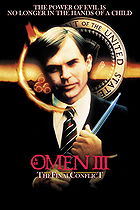 Posted : 16 years, 11 months ago on 2 July 2008 05:11
(A review of Omen III: The Final Conflict)
Posted : 16 years, 11 months ago on 2 July 2008 05:11
(A review of Omen III: The Final Conflict)
According to the law of deteriorating sequels, films get worse as each new instalment is created. The Final Conflict is further irrefutable verification of this theory. The first two instalments in the Omen series were not among the genre's finest movies, but stood well on their respective standalone merits. The central problem of The Final Conflict (which marks the third The Omen film) is its tendency to be overwhelmingly silly - no scares, dumb characters, horrible plot points, and little sense of fidelity to the Book of Revelations on which the series is based. The artistic positives of the first film are also disregarded, with bucket loads of nothing but violence and gore as a substitute. Glaring continuity errors plague this film as well. I mean, the year is apparently 1982 and Damien Thorn (now played by Sam Neill) is supposedly 32. In the first movie he was born in 1966...can anyone else notice the unbearably distracting continuity fault? If Damien was 32 then the year should be the late 1990s. At that stage, you'd might as well regard your political leader as the Antichrist!
The Final Conflict now follows Damien Thorn - a.k.a. the offspring of Satan - as an adult who is steadily running the Thorn industries conglomerate as the company extends its far-reaching arms all over the world. The film opens with a salvage operation in Chicago to recover the artefacts that survived the destruction of the Thorn Museum that burnt down at the end of Damien: The Omen II. During the operation, the seven daggers of Megiddo are recovered. Said daggers are the only things on Earth that can kill the Antichrist. They are soon circulated to an assembly of seven monks, headed by Father DeCarlo (Brazzi), who embark on a mission to rid the world of Damien Thorn. Meanwhile, Damien flexes his political muscle as he is appointed Ambassador to England. The seven monks begin executing multiple hysterically ill-conceived endeavours to assassinate the Antichrist. All signs begin pointing to the possibility that that Nazarene has returned in the form of a child in the British Isles. This begins another ludicrous sub-plot as Damien sets out to eliminate the Nazarene who weakens and diminishes his influence and ability on the world with each passing day. Meanwhile, a dumb romantic sub-plot is tossed into the mix as Damien becomes interested in a journalist named Kate Reynolds (Harrow).
The Final Conflict depends far too much on the showcase of effects and innovative (gory) methods of killing different characters...all without tension or scares. Jerry Goldsmith's score is the only aspect that creates a somewhat intense atmosphere. Every other aspect of the filmmaking leaves a lot to be desired. The horror genre that was once prominent has now transformed into a film perplexingly lingering in an indefinite genre between 'horror' and 'drama'. There is insufficient horror to be part of the genre, and there is inadequate drama to be classified as part of that genre. The gore effects have been amplified and look superior to those used in the previous films; however the screenwriting leaves much to be desired. Horror fans will be left disappointed and disorientated, fans of the Omen series will be left even more devastated, while religious nuts will condemn the film! Why? The source material is disregarded while spiralling towards the film's silly conclusion that ultimately confirms this as a wasted opportunity. The ending seems far too rushed and looks underwhelming. I was laughing! I wasn't at all scared!
Overall, The Final Conflict is an extremely disappointing addition to a potentially outstanding horror series. The series of events were occasionally fascinating, but ultimately very silly. Like the first two movies the cast is very impressive, with Sam Neill effective as the Antichrist. The actors do everything in their capability to improve the woeful script they are working with. If only the first film concluded with the execution of the Antichrist...if that happened, then the world wouldn't have been exposed to two below average sequels. At least there's finally a sense of closure. Followed by a TV movie a decade later.
4.0/10
 0 comments, Reply to this entry
0 comments, Reply to this entry
A fun romp!
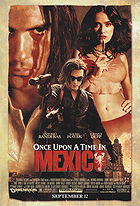 Posted : 16 years, 11 months ago on 1 July 2008 08:18
(A review of Once Upon a Time in Mexico)
Posted : 16 years, 11 months ago on 1 July 2008 08:18
(A review of Once Upon a Time in Mexico)Agent Sands: "I can't see, fuck-mook. I have no eyes."
Robert Rodriguez's El Mariachi trilogy is brought to a conclusion with the entertaining, big budget Once Upon a Time in Mexico. Something must be stated about the Rodriguez method of filmmaking: the critics perceive his films as unadulterated crap because they're generally pure action with desperately convoluted plots. On the other hand, action lovers such as myself will delight in the inexorable blood, gore and action the director habitually flaunts. This instalment in Rodriguez's El Mariachi trilogy features an enormously impressive cast including the return of Antonio Banderas and Salma Hayek (among others) mixed with new names such as Johnny Depp, Ruben Blades, Mickey Rourke and Willem Dafoe. What started as a small film made on a $7,000 budget featuring a cast of friends and unknowns (in the original El Mariachi) has ended on an extremely larger scale and with more action, blood and guts with an extraordinary cast to boot.
Once Upon a Time in Mexico is another tale of the famed musician-turned-gunslinger only known as the "El Mariachi" (Banderas, reprising the role from Desperado). The character's story started a long time ago when a naïve, simple mariachi (played by Carlos Gallardo) was seeking a job when he accidentally came into possession of a guitar case stocked with an impressive assortment of weapons. His girlfriend was slaughtered, and our hero went on a fierce rampage. He slaughtered the bad guys but was wounded, and another love was taken from him - his ability to play the guitar. That was El Mariachi: the first film in the series that was made on an ultra low budget but was so successful that Columbia gave it a theatrical release. Following Rodriguez's unexpected directorial triumph, he made Desperado with Hollywood backing to bring the series a fresh new look. Antonio Banderas took over as the character of "El Mariachi" in the second instalment, receiving a new guitar case loaded with an improved arsenal of firearms. The first embodiment of the character was a simple man who was placed into incredible situations and strained to become a hero. Banderas' portrayal was that of an extraordinarily accomplished gunslinger who is the biggest and baddest in the land and a man who has found new love in the spicy Salma Hayek.
Once Upon a Time in Mexico, the third film, picks up after the events of the first two movies. We now find the El Mariachi who has retreated to a life of isolation: he's haunted and scarred by the tragedy of losing his new wife Carolina (Hayek). The legend of the character has become so fabled that even the Mexican president is looking to have him eliminated. Now without his love, he settles in a tranquil town. A corrupt CIA agent known as Agent Sands (Depp) wants to eliminate the Mexican president and pulls the El Mariachi out of retirement to complete the task. He compares his reasoning to that of shooting a chef: to bring balance to country. He explains that if a chef cooks a meal that is the best he's ever tasted, the chef must be executed to give other chefs a chance to excel at their profession. Sands knows that the El Mariachi will have no problem with fulfilling his task as it will allow him retribution on the man that killed Carolina. At least that's what I picked up of the plot. There are so many characters and conspiracies here that it gets a tad too perplexing for a dumbarse action film. However, it is still watchable and as a swansong to the trilogy this ambitious film does pale the former releases.
Once Upon a Time in Mexico is held together by the stellar cast that features some amazing actors. Antonio Banderas is engaging and credible as the infamous El Mariachi. But for this film, it's Johnny Depp that completely steals the show. Depp again displays his versatility, and reminds us why he's one of this generation's finest performers. With the character of Agent Sands, he skilfully pulls off the subtle wit and humour of the character. The screenwriter granted Depp lots of terrific dialogue that he pulls off remarkably! Johnny Depp is in supreme Johnny Depp mode with Agent Sands. One of the film's highlights is a diner scene that depicts excellent dialogue between Depp and Banderas. Also in the cast you'll discover an extremely cool Mickey Rourke, a sinister Willem Dafoe, and a few good actors such as Danny Trejo and Eva Mendes among others.
Once Upon a Time in Mexico greatly benefits from the style and approach supplied its director (who was also the producer, editor, cinematographer, production designer, sound effects mixer, visual effects supervisor, camera operator and the one who supplied the music). Rodriguez is a capable filmmaker that has a unique look and feel that he brings to his creations. He isn't afraid of attempting different things with the camera and he is one of the few directors that can make fast cuts and edits actually work without being annoying. Rodriguez crafts films that progress and perform rapidly. He doesn't allow the viewer much time to rest. In a society plagued with movie-goers whose attention spans are becoming increasingly short, Rodriguez makes films that have no issues with keeping short attention spans happy. This is his greatest gift. In short, Rodriguez knows how to make a film fun. He demonstrated with Spy Kids that he's able to keep the kids happy, and it shows his talents are even greater for the adults in Once Upon a Time in Mexico.
Overall, when it comes to a Robert Rodriguez film a movie-goer expects nothing further than outstanding action scenes. The director has a genuine talent for directing and lensing over-the-top action filled with over-the-top bloodshed. The stunts, special effects and explosions all look spectacular! Once Upon a Time in Mexico is not recommended for those searching for a deep experience or an exemplary character examination. Instead, it's for those looking to be reminded why we go to the cinema in the first place: we indulge in the magic of the movies to be entertained! If you're able to overlook the glaring story issues, you will definitely enjoy this film. The film's shootouts are as over-the-top as you can find. They border on silliness at times, but it's difficult not to enjoy a good guy knocking a bad guy across the room with a shotgun. Rodriguez is an action film director who takes pride in his work. You must respect him for that. Look out for Johnny Depp in the church scene doing his Marlon Brando impersonation.
8.1/10
 0 comments, Reply to this entry
0 comments, Reply to this entry
True cinematic art!
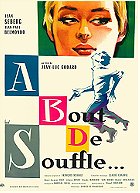 Posted : 16 years, 11 months ago on 30 June 2008 11:25
(A review of Breathless (1960))
Posted : 16 years, 11 months ago on 30 June 2008 11:25
(A review of Breathless (1960))
Even several decades after its initial release, French director Jean-Luc Godard's Breathless is still considered a defining, influential classic drama. Every few decades, a film emerges that presents a breakthrough in filmmaking. In the case of Breathless, the technical innovations and its incredibly groundbreaking style are still inspirational into the 21st century. Other revolutionary aspects include the impeccably impetuous pacing, elegant editing, potent atmosphere and the considerable substance present during a scene of drama. Godard's work is still held in high esteem; with film schools around the globe using this fine artistic slice of moviemaking as a reference...this is a tribute to an extraordinary director who achieved amazing things during his career.
Breathless is austerely remarkable even with an extremely straightforward plot. Its brilliance is drawn from the director's ability to achieve something so simple and yet so amazing. Michel Poiccard (Belmondo) is a sociopath and a small-time crook with a gangster persona who idolises the work of Humphrey Bogart. Michel becomes the subject of a manhunt when he flees after stealing a car and impulsively murdering a policeman that pursued him on a country road. Michel, now wanted by the authorities, returns to Paris where he finds a former American girlfriend named Patricia Franchini (Seberg) who studies journalism and supplies the streets with copies of the New York Herald-Tribune. Michel succeeds in seducing Patricia again, and desires for her to accompany him to Italy when he raises the money. Even with his face dominating the local newspapers and being the centre of a media frenzy, Michel seems unmindful of the police dragnet that slowly tightens its grip around him. He spends most of his time with Patricia evading police and enjoying pleasures in bed. Michel's desperation develops as the police pursue him, while he recklessly pursues his love of American movies and his strong libidinous interest in the beautiful young Patricia.
The storytelling techniques of Jean-Luc Godard are possibly the most mesmerising aspect of the film. To your typical modern audience, the jump cuts may seem lame. However, an audience must observe these editing methods from a historical perspective: never had any filmmaker utilised these prior to Godard's masterpiece. This is precisely why Breathless is such an important movie - virtually every technique is revolutionary. Through the eyes of current movie-goers, these are so submerged in filmmaking practices now that Breathless seems typical. Yet in 1960, these techniques were simply unprecedented. Director Godard's talent is also in the fantastic way the plot progresses. Each shot is framed with style and demonstrates the elegance frequently employed by Godard. All sets, locations and characters carry a certain degree of potency. For those who've studied the period, it's easy to notice the significant facets of life that are represented with great veracity. No exaggerations, no attempt to dilute the period.
Even the characters are constructed from aspects of life! These characters are wonderfully executed by a talented cast. Frankly I did not care for the film until the inclusion of an extremely long sequence in a bedroom. The drama evinces substance and magnificent artistic integrity in the filmmaking as well as the acting. The chemistry between Jean-Paul Belmondo and Jean Seberg sizzles. Belmondo is charismatic in the title role. It's vital that the audience are able to empathise with him despite the character being a criminal on the run from the law. His charm in line deliveries and facial expressions boost the attraction of his on-screen persona. Jean Seberg is young, beautiful and angelic. Interestingly enough, the actress failed at American movies and fled to Europe. She was at a tender age of 21 when director Godard added her to the cast of his movie. These characters are archetypal and legendary. Look at Al Pacino, Jack Nicholson and Warren Beatty...men whose characters have descended from Belmondo's outstanding performance.
Breathless is a landmark in French cinema, as well as filmmaking worldwide. The originality in the fascinating plot is irresistible, and the viewer is drawn in by the solidity and strength of Godard's directing. To indulge in the magic of this movie is to visit a film as important as Citizen Kane, although sadly the film is less recognised and further overlooked in this current cinematic age. The film is simply a magnificently entertaining film that is the work of an artist. All film students must add this film to their collection and begin taking notes. Breathless is cinematic art that will leave you breathless! (Pun absolutely, positively intended!)
8.9/10
 0 comments, Reply to this entry
0 comments, Reply to this entry
The best Aussie TV show for years...
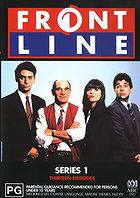 Posted : 16 years, 11 months ago on 29 June 2008 12:15
(A review of Breaking News)
Posted : 16 years, 11 months ago on 29 June 2008 12:15
(A review of Breaking News)"I'm Mike Moore...welcome to Frontline"
By the mid-1990's, Current Affairs programs had developed into a strange nightly beast on our television screens. These programs were more tabloid than journalism: few viewers truly understood the extent to which they were being manipulated. Even in the current generation of television viewers, shows like Today Tonight and A Current Affair are seen to be concealing themselves behind the facade of journalistic professionalism. Yet they feed us nothing but tiring stories about weight-loss and dodgy tradesmen, in addition to shameless network promotions and pointless celebrity puff-pieces. Stories broadcast in these Current Affairs programs are not determined by their importance but their entertainment value. How severely will ratings rise if fascinating (futile) stories constantly fill their time-slot?
Enter the brilliant satire team of Rob Sitch, Santo Cilauro and Tom Gleisner. Following the triumph of The Late Show in 1992 and 1993, and prior to the creation of The Castle (still regarded as Australia's best film) in 1997, the team behind those classic Australian comedies produced what is extensively regarded as one of the smartest and funniest satire comedy series ever created in Australia. This aforementioned series was of course Frontline, and the fact that many of the episodes are still used as a part of school syllabuses around the country is a testament to the esteem in which the series is held.
In the early 1990s, Frontline took audiences completely by surprise. The brilliant show opened up the eyes of the gullible viewing public to some of the more dubious and entirely debauched procedures of commercial tabloid television...all while stocking a high amount of laughs. Frontline covers everything in the dishonest Current Affairs industry: from the use of concealed cameras, the standard foot-in-the-door bullying approach of interviewing, the vulgarity of cheque-book journalism and the necessity to consider ratings wins above everything else - Rob Sitch and his loyal team include the whole package. The show also deals with the huge egos noticeably present in commercial television and the incapacity for many television stars to stop thinking about anything apart from themselves. Frontline satirised many events that were topical at the time: such as a real event when the host of A Current Affair, Mike Willesee, actually talked to a gunman during a siege. Within one series of the wildly innovative program, the team managed to tear down the apocryphal pretences constantly surrounding the medium using brilliant satire without exaggerations.
Frontline is fundamentally a satirical fly-on-the-wall account (almost documentary style) of the background workings of a commercial television Current Affairs program. 'Frontline' is the title of the news program aired each weeknight on an unnamed commercial network. Consider a cross between A Current Affair and Today Tonight...and you are accurately comprehending the types of stories that Frontline is after. The show is hosted by former ABC journalist Mike Moore (Rob Sitch). Mike believes that he's hard hitting and in the same league as Laurie Oakes or Kerry O'Brien, but in actuality he's fairly light weight and nothing overwhelmingly superior to a talking head. Mike uses a great deal of each episode trying to prove his journalistic worth and increase his standing in the hierarchy of Australian television...all without much success.
The on-air reporting responsibilities are carried out by Brooke Vandenberg (Jane Kennedy) and Martin Di Stasio (Tiriel Mora). Brooke is a highly motivated, upwardly mobile young lady who will let nothing get in her way as she scrambles to the very top of the television pile. Marty is a somewhat disparaging, hard-bitten and extremely rough-around-the-edges veteran journalist of countless years. He's seen and done it all, and genuinely cannot be bothered with all the shenanigans of those wannabes surrounding him. Similar to Brooke, he has been known to bend a few rules and stretch the journalist’s code of ethics to breaking point to secure the exclusive story. The man charged with the responsibility of getting the show to air each night and keeping the ratings on the upward trend is executive producer Brian Thompson (the late Bruno Lawrence). Brian is a man with one eye on the ratings, one on his staff, and one on the executives pushing for higher ratings. His life is one extreme stress attack and he is never settled. The real brains and effort behind each of the stories is program producer Emma Ward (Alison Whyte), who comes up with most of the ideas for the stories, does almost all the research, and is also probably the only staff member with any hint of veracity.
The creative team behind Frontline did not exaggerate because there was no need - Current Affairs programs generally used over-the-top methods of getting the most fascinating stories to boost their ratings. This behind-the-scenes examination looks in-depth at two different aspects of the show: the journalism + planning of an episode, and the broadcasting of an episode with Mike at the newsdesk. These two aspects portray a different version of the truth. While the show is being planned, we watch the actual truth being manipulated by the sneaky journalists. This aspect of the show is portrayed using hand-held camera as it is essentially behind-the-scenes footage. During a broadcast, the manipulated version of the truth is shoved into the head of the viewer. Of course, these shots are filmed using steady tripod camera.
Overall, Frontline is a clever Australian TV show that is still rightfully held in high regard over a decade since its initial release. The form of humour is dissimilar to the brainless slapstick and constant swearing present in American humour. It's a breath of fresh air. This is a stunning show which relied on a subtle wit and an intelligent dissection of a media white elephant. Watch this series and you will never, ever look at A Current Affair, Today Tonight, or the myriad of other current affairs shows that have long come and gone in the same way again.
9.0/10
 0 comments, Reply to this entry
0 comments, Reply to this entry
 Login
Login
 Home
Home 183 Lists
183 Lists 1670 Reviews
1670 Reviews Collections
Collections